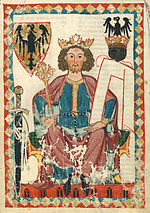Henry VI, Holy Roman Emperor, Date of Birth, Place of Birth, Date of Death
TweetHenry VI, Holy Roman Emperor
German nobleAbout Henry VI, Holy Roman Emperor
- Henry VI (Heinrich VI) (November 1165 – 28 September 1197), a member of the Hohenstaufen dynasty, was King of Germany (King of the Romans) from 1190 and Holy Roman Emperor from 1191 until his death.
- From 1194 he was also King of Sicily. He was the second son of Emperor Frederick Barbarossa and his consort Beatrix of Burgundy.
- In 1186 he was married to Constance of Sicily, the posthumous daughter of the Norman king Roger II of Sicily.
- Henry, stuck in the Hohenstaufen conflict with the House of Welf until 1194, had to enforce the inheritance claims by his wife against her nephew Count Tancred of Lecce.
- Henry's attempt to conquer the Kingdom of Sicily failed at the siege of Naples in 1191 due to an epidemic.
- Based on an enormous ransom for the release of King Richard I of England, he conquered Sicily in 1194; however, the intended unification with the Holy Roman Empire ultimately failed due to the opposition of the Papacy. Henry threatened to invade the Byzantine Empire after 1194 and succeeded in extracting a ransom, the Alamanikon, from Emperor Alexios III Angelos in return for cancelling the invasion.
- In 1195 and 1196 Henry attempted to turn the Holy Roman Empire from an elective to a hereditary monarchy, the so-called Erbreichsplan, but met strong resistance from the prince-electors and abandoned the plan.
- Henry pledged to go on crusade in 1195 and began preparations.
- A revolt in Sicily was crushed in 1197.
- The Crusaders set sail for the Holy Land that same year but Henry died of illness at Messina on 28 September 1197 before he could join them.
- His death plunged the Empire into the chaos of the German throne dispute for the next 17 years.
Read more at Wikipedia
See Also
- Famous People's Birthdays on 01 November, Netherlands
- Famous People's Birthdays in November, Netherlands
- Famous People's Birthdays on 01 November, Germany
- Famous People's Birthdays in November, Germany
- Famous monarch's Birthdays on 01 November, Netherlands
- Famous monarch's Birthdays in November, Netherlands
- Famous writer's Birthdays on 01 November, Netherlands
- Famous writer's Birthdays in November, Netherlands
- Famous composer's Birthdays on 01 November, Netherlands
- Famous composer's Birthdays in November, Netherlands
- Famous monarch's Birthdays on 01 November, Germany
- Famous monarch's Birthdays in November, Germany
- Famous writer's Birthdays on 01 November, Germany
- Famous writer's Birthdays in November, Germany
- Famous composer's Birthdays on 01 November, Germany
- Famous composer's Birthdays in November, Germany


 Date of Birth:
Date of Birth:  Place of Birth: Nijmegen, Gelderland, Netherlands
Place of Birth: Nijmegen, Gelderland, Netherlands